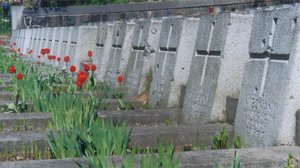Rossa
|
|
Rossa Cemetery (Lit. Rasų kapinės, Pol. Cmentarz na Rossie) is an old cemetery in the Lithuanian city of Vilnius. Since Vilnius used to be a center of Lithuanian-Polish culture, there are a lot of famous people, including heart of Pilsudski, buried there. It's one of the oldest still existing cemeteries in Central Europe and the world.
Founded in 1769 by Bazyli Miller, the mayor of Wilno, in the place of ancient pagan temple and a small plague necropoly. He was also the first person to be buried there. In 1801 a chapel and belltower were built.
After 1844 Rossa received a new, neo-gothical shrine. It was built by Józef Bohdanowicz, local priest, and Jan Waszkiewicz, University of Wilno professor. In 1920 a small military cemetery was built near the enterance for the solders who died in the city during the Polish-Bolshevik War. It was rebuilt in 1935-1936 by Wojciech Jastrzębowski, who also made a project of Piłsudski's tombstone.
Invasion
Until September 18, 1939, when the Red Army entered the city, a honorary guard of three soldiers stood there at all times. Three unknown soldiers who refused to give up their arms to the Soviets in 1939 were shot on the spot and are now buried next to Marshall Piłsudski.
Part of the cemetery contans graves of Polish Home Army soldiers, who fell during the Wilno Uprising. Their graves, demolished after the war, were rebuilt by the Polish state in 1993.
Desecration
The whole Rossa cemetery was to be destroyed in the 1980s as the Soviet authorities planned a major motorway to be built directly through the cemetery. Fortunately, a press campaign led by Polish-language "Czerwony Sztandar" (Red Banner) newspaper and economical difficulties halted the destruction.
Rossa is a burial place for many famous Poles. Among them are:
- Joachim Lelewel, historian, professor of the University of Wilno
- Władysław Syrokomla, writer
- count Eustachy Tyszkiewicz (1814-1873), historian, archaeologist
- Czesław Jankowski (?-1929), poet
- Euzebiusz Słowacki, father of Polish poet Juliusz Słowacki
- Janina Burchardówna (1883-1924), journalist, teacher and freedom-fighter
- Wacław Dziewulski (1882-1938), phisycian, professor of the University of Wilno
- Antonina Fiszer (1824-1840), actress
- Jan O'Connor (1760-1802), medic, professor of the University of Wilno
- Adam Piłsudski (1869-1935), a long-time president of Wilno
- Władysław Horodyjski (d. 1920), philosopher, professor of the University of Wilno
- Franciszek Smuglewicz (1745-1807), painter, professor of the University of Wilno
- Józef Montwiłł, humanist and sponsor of countless hospitals, orphanages and museums
- Adam Jocher (1791-1860), founder of the first public library in Wilno
- Juliusz Kłos (1881-1933), architect, author of the first guidebook to Wilno.
- Józef Łukaszewicz (1863-1928), professor of the vilnian university, revolutionist and long-time prisoner of czarist prison in Shlisselburg
- Two brothers, mother, first wife and heart of Józef Piłsudski, Polish statesman
- Antoni Wiwulski (1877-1919), architect and sculptor
- Bronisław Wróblewski (1888-1941), lawyer
- Jędrzej Śniadecki, (1768-1838), writer, medic, chemist and biologist
There is also a mass grave of Poles kidnapped in Wilno by the Bolsheviks in 1919 and shot in Daugavpils.
At the Rossa cemetery there are also graves of famous Belarusians and Lithuanians, among them:
- Mikalojus Konstantinas Čiurlionis, painter and composer
- Andriey Levicki, writer
- Jonas Basanavičius, scientist
- Kazys Boruta, writer
- Petras Cvirka, writer
- Povilas Viinskis, book spreader, writer
- Antanas Vileiis, doctor, public manpl:Cmentarz na Rossie

